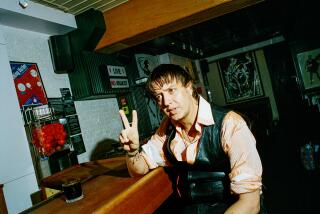Incubus guitarist Mike Einziger’s ‘End. > vacuum’ to premiere at UCLA’s Royce Hall
As the guitarist for hard-edged pop-rock band Incubus, Mike Einziger has headlined arenas and festivals around the world. But standing in a rehearsal room at Los Angeles Valley College in front of an assembly of trained musicians gearing up to perform his “End.>vacuum,” an ambitious “Realization in Nine Movements” that will have its premiere today at UCLA’s Royce Hall, he seems, well, nervous.
Einziger, 32, fiddles with various keyboards and devices, including three vintage typewriters and an old gramophone that he and two friends will play to supplement the more traditional orchestra. It’s clear he understands the pitfalls of such ventures.
While a handful of rockers have found success and acclaim in orchestral settings -- Danny Elfman, Frank Zappa, Radiohead’s Jonny Greenwood -- others have come off as overreaching dilettantes or, worse, pretentious boors. But the Calabasas native, who’s about to head east to study music at Harvard, says the risk was necessary for him creatively.
“I’ll be the first person to tell you things could go horribly wrong,” he says. “At the same time, I ask, ‘Why would I just stay in my comfort zone?’ I’ve always followed my musical instincts. If it all works out badly, that will be what happens: It will be horrible and people will laugh, and I’ll just have to figure out what to do after that.”
Einziger’s inspiration for the piece came from the Disney animated showcase “Fantasia,” a constant presence in his childhood, and he first began working on “End.>vacuum” in the spring of last year while he was recovering from surgery to correct carpal tunnel syndrome. He received encouragement from his longtime friend Elfman and his mother, Nancy, a music teacher.
The title functions as a word illustration of the idea that “the end of life and existence as we know it” leads to “the return to the vacuum of space we exist in, or we think we exist in,” Einziger says.
Tonight’s performance will be prefaced by a short talk about modern science by physicist-author-educator Brian Cox, whom Einziger met on a visit to the site of the Large Hadron Collider being built under the French-Swiss border -- quantum physics being another interest of the musician. The performance will be accompanied by visuals designed by several of Einziger’s friends, and 3-D glasses will be distributed to the audience.
At the rehearsal, orchestrator-conductor Suzie Katayama, a veteran of rock/classical intersections, addresses the problems of perception when it comes to these sort of things as she formally introduces Einziger to the musicians.
“This is his legitimate . . . ,” she catches herself on the word before continuing, “his real music.” Perhaps realizing that still sounds like a backhanded compliment, she quickly adds, “Other than rock ‘n’ roll.”
As Katayama leads the more-than-50-strong ensemble through the first bars of the opening movement, titled “Exit Lense,” it’s clear that the composer is no dilettante. The jagged pulse of Igor Stravinsky and the glissando and legato swoops and flutters of György Ligeti, two of many 20th century influences Einziger readily discusses, emerge as prominent elements.
The musicians, veteran orchestra pros mixed with some Incubus family and friends, start to show both confidence and connection with the largely tonal but harmonically layered music. Mom Nancy beams from a chair off to the side. The energetic, engaging Katayama keeps the spirit at once vibrant and focused.
Einziger’s work plays with time. Pulsating tribal/mechanical rhythms melt into sustained, almost static stretches before the rhythm reemerges. The early-’80s large ensemble work of John Adams comes to mind, but the character of the piece is Einziger’s own.
During a break, Einziger seems happy, if a bit dazed. He can probably relax. The musicians have. Harpist Gayle Levant smiles broadly between movements and says, “I’m having a ball!”
More to Read
The biggest entertainment stories
Get our big stories about Hollywood, film, television, music, arts, culture and more right in your inbox as soon as they publish.
You may occasionally receive promotional content from the Los Angeles Times.










